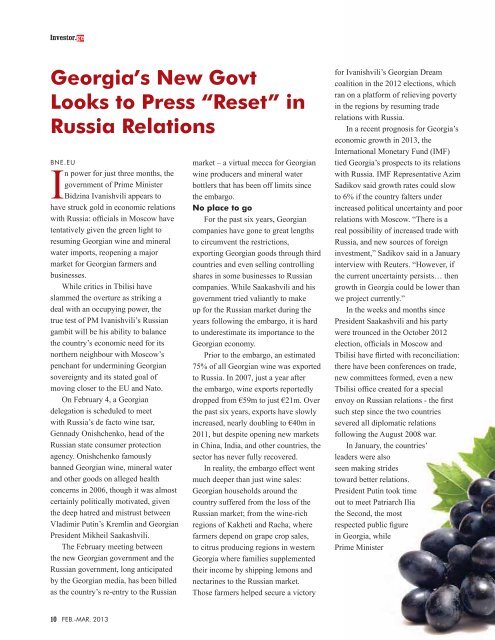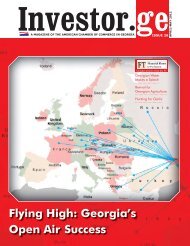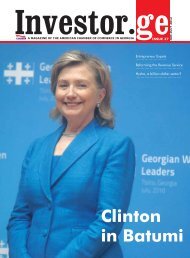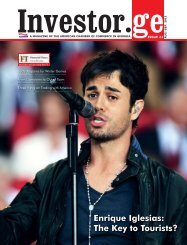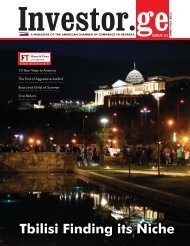Issue 1, 2013 February-March - Investor.ge
Issue 1, 2013 February-March - Investor.ge
Issue 1, 2013 February-March - Investor.ge
- No tags were found...
You also want an ePaper? Increase the reach of your titles
YUMPU automatically turns print PDFs into web optimized ePapers that Google loves.
In power for just three months, thegovernment of Prime MinisterBidzina Ivanishvili appears tohave struck gold in economic relationswith Russia: officials in Moscow havetentatively given the green light toresuming Georgian wine and mineralwater imports, reopening a majormarket for Georgian farmers andbusinesses.While critics in Tbilisi haveslammed the overture as striking adeal with an occupying power, thetrue test of PM Ivanishvili’s Russiangambit will be his ability to balancethe country’s economic need for itsnorthern neighbour with Moscow’spenchant for undermining Georgiansovereignty and its stated goal ofmoving closer to the EU and Nato.On <strong>February</strong> 4, a Georgiandelegation is scheduled to meetwith Russia’s de facto wine tsar,Gennady Onishchenko, head of theRussian state consumer protectiona<strong>ge</strong>ncy. Onishchenko famouslybanned Georgian wine, mineral waterand other goods on alle<strong>ge</strong>d healthconcerns in 2006, though it was almostcertainly politically motivated, giventhe deep hatred and mistrust betweenVladimir Putin’s Kremlin and GeorgianPresident Mikheil Saakashvili.The <strong>February</strong> meeting betweenthe new Georgian government and theRussian government, long anticipatedby the Georgian media, has been billedas the country’s re-entry to the Russianmarket – a virtual mecca for Georgianwine producers and mineral waterbottlers that has been off limits sincethe embargo.For the past six years, Georgiancompanies have gone to great lengthsto circumvent the restrictions,exporting Georgian goods through thirdcountries and even selling controllingshares in some businesses to Russiancompanies. While Saakashvili and hisgovernment tried valiantly to makeup for the Russian market during theyears following the embargo, it is hardto underestimate its importance to theGeorgian economy.Prior to the embargo, an estimated75% of all Georgian wine was exportedto Russia. In 2007, just a year afterthe embargo, wine exports reportedlydropped from €59m to just €21m. Overthe past six years, exports have slowlyincreased, nearly doubling to €40m in2011, but despite opening new marketsin China, India, and other countries, thesector has never fully recovered.In reality, the embargo effect wentmuch deeper than just wine sales:Georgian households around thecountry suffered from the loss of theRussian market; from the wine-richregions of Kakheti and Racha, wherefarmers depend on grape crop sales,to citrus producing regions in westernGeorgia where families supplementedtheir income by shipping lemons andnectarines to the Russian market.Those farmers helped secure a victoryfor Ivanishvili’s Georgian Dreamcoalition in the 2012 elections, whichran on a platform of relieving povertyin the regions by resuming traderelations with Russia.In a recent prognosis for Georgia’seconomic growth in <strong>2013</strong>, theInternational Monetary Fund (IMF)tied Georgia’s prospects to its relationswith Russia. IMF Representative AzimSadikov said growth rates could slowto 6% if the country falters underincreased political uncertainty and poorrelations with Moscow. “There is areal possibility of increased trade withRussia, and new sources of foreigninvestment,” Sadikov said in a Januaryinterview with Reuters. “However, ifthe current uncertainty persists… thengrowth in Georgia could be lower thanwe project currently.”In the weeks and months sincePresident Saakashvili and his partywere trounced in the October 2012election, officials in Moscow andTbilisi have flirted with reconciliation:there have been conferences on trade,new committees formed, even a newTbilisi office created for a specialenvoy on Russian relations - the firstsuch step since the two countriessevered all diplomatic relationsfollowing the August 2008 war.In January, the countries’leaders were alsoseen making stridestoward better relations.President Putin took timeout to meet Patriarch Iliathe Second, the mostrespected public figurein Georgia, whilePrime Minister


